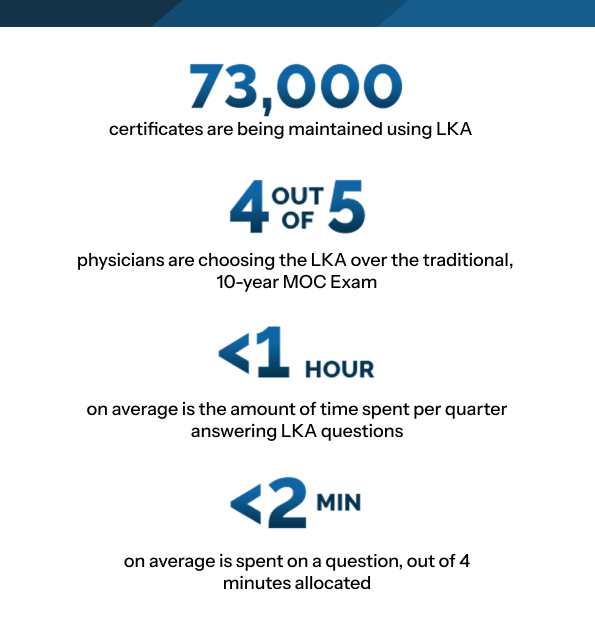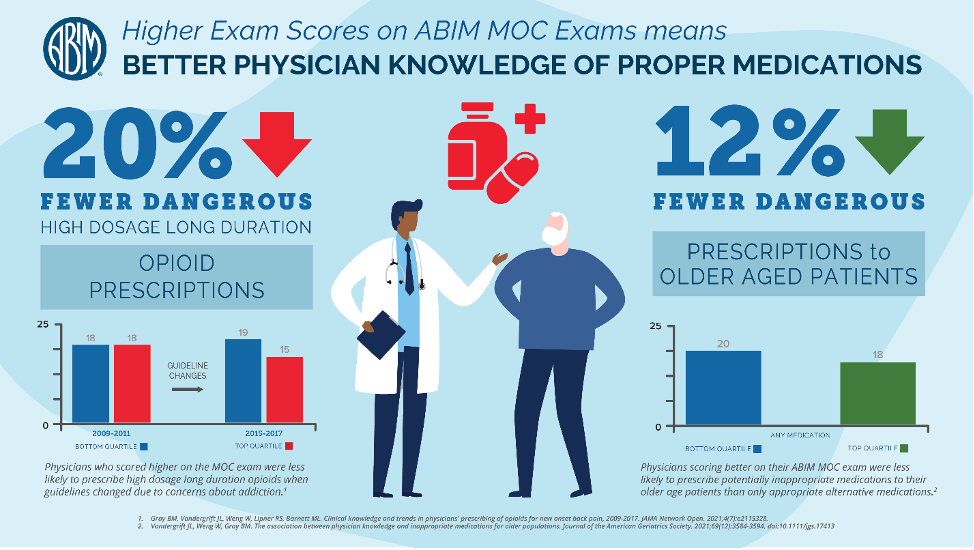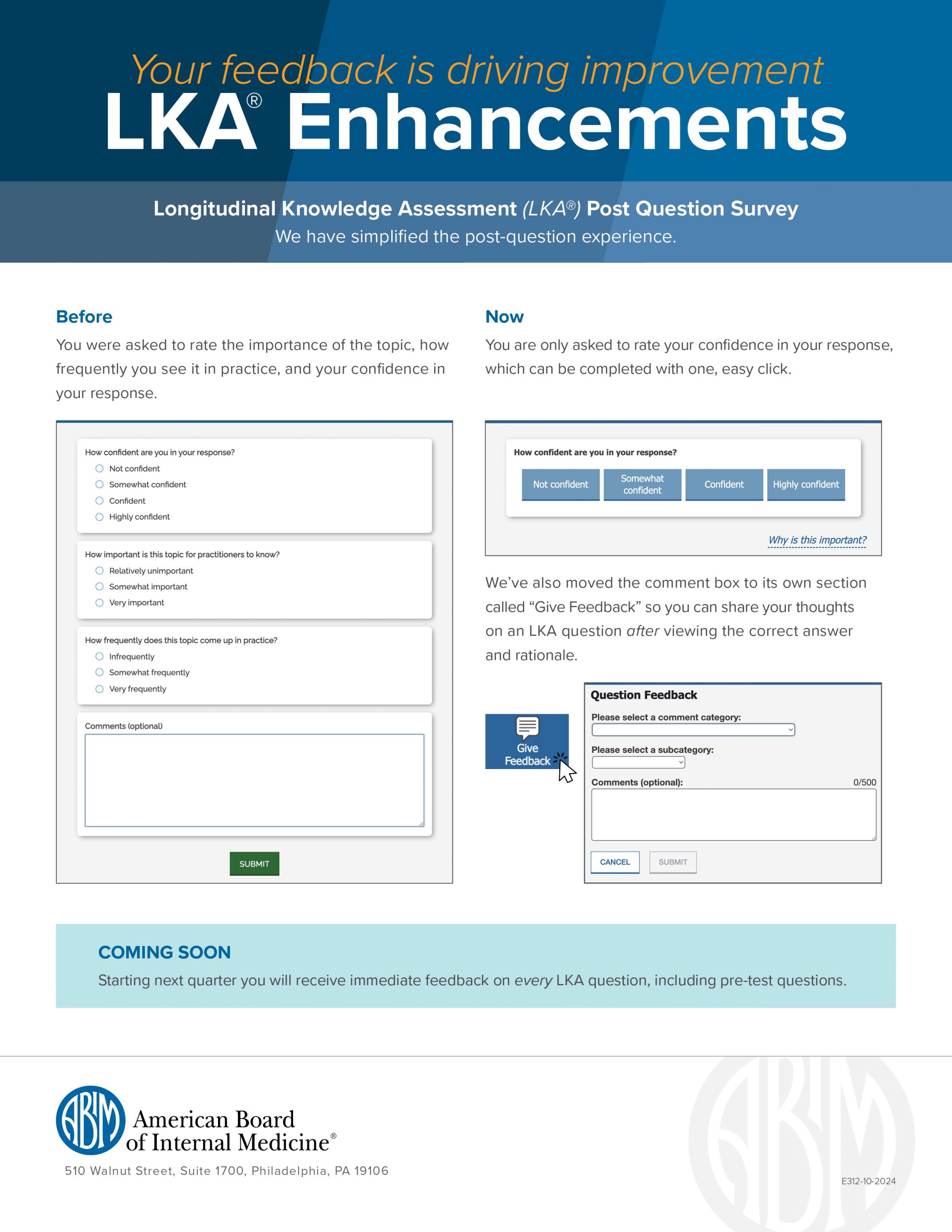In this edition of News & Notes …
- A message from Dr. Furman S. McDonald, President and CEO of ABIM and the ABIM Foundation
- ABIM eliminates the 2-year MOC point requirement effective immediately
- Important certification and MOC dates to know
- The value of MOC
- How does ABIM determine the standard for passing an assessment?
- LKA at a glance
- LKA Update: Your feedback is driving improvement
- ABIM Director, Governance alumni and diplomates elected to National Academy of Medicine
A message from Dr. Furman S. McDonald, President and CEO of ABIM and the ABIM Foundation

As the fifth President and CEO of the American Board of Internal Medicine, I am honored to join you today, October 28, in recognizing and celebrating Internal Medicine Day. Every day patients entrust their care to board certified physicians like you. It’s a tremendous honor and privilege. I admire the time, dedication and commitment you’ve made throughout your career to keep your medical knowledge current in service of the profession.

Since the first 27 internists were certified by ABIM in 1936, the specialty has grown considerably. This year, for the first time ever, the number of physicians who became certified in internal medicine exceeded 10,000 in a single year!
To all of these newly certified internists, ABIM extends its warmest congratulations and welcome. You have chosen a specialty that is both broadly based and filled with many specific opportunities. Whether you practice primary care internal medicine or choose any of the 20 internal medicine subspecialties, your patients will come to see you as a trusted partner in the diagnosis and treatment of a wide range of conditions, and throughout the years you will experience the joy of helping many of them to lead healthier lives.
I hope you take a moment today to celebrate the profession of internal medicine, reflect on how far we’ve come and appreciate that our future together is bright.
All the very best,
Furman S. McDonald, MD, MPH
President and CEO
Professor of Medicine
ABIM eliminates 2-year MOC point requirement effective immediately
ABIM is eliminating the requirement to earn points every two years (2-year point requirement) to be listed as participating in Maintenance of Certification (MOC). The decision to retire the requirement was based on feedback from physicians, who said it was confusing and did not provide added value.
This programmatic change is effective immediately, meaning that diplomates who were expected to meet the 2-year point requirement by the end of 2024 are no longer required to do so. Additionally, diplomates currently reported as “Certified, Not Participating in MOC” due to missing the 2-year point requirement will have their status updated to “Certified, Participating in MOC” as long as all other MOC requirements are met.
ABIM is currently updating the Physician Portal and public website to reflect these changes, and affected diplomates will receive an email notification once they are completed.
“I have spent a lot of time listening to physicians and nearly every one of them mentioned that they are balancing many competing demands on their time,” said Furman S. McDonald, MD, MPH, who became President and CEO of ABIM and the ABIM Foundation on September 1. “This is one thing we feel we can take off your plate without compromising the value of the MOC program. ABIM is committed to continuing to listen to physician feedback on our programs and streamlining the process wherever possible.”
The requirement to earn 100 MOC points every five years to be reported as “Certified, Participating in MOC” still remains in effect. Points can be earned in several ways, including participating in the Longitudinal Knowledge Assessment (LKA®) (which earns up to 24 points annually), taking the traditional, 10-year MOC exam (20 points), participating in certain CME activities that are also eligible for MOC points or becoming ABIM Board Certified in a subspecialty for the first time (100 points). If you have any questions about your requirements, we encourage you to email request@abim.org.
Important certification and MOC dates to know
As we approach the busy holiday season, we wanted to make sure you have easy access to some important dates related to certification and MOC to help you stay on track:
Enrollment and Registration
December 1, 2024: Enrollment opens for all assessments.
February 28, 2025: Enrollment closes for the Spring 2025 traditional, 10-year MOC Exam.
February 28, 2025: The last day to request special accommodations for the Spring 2025 traditional, 10-year MOC Exam*.
June 30, 2025: Enrollment closes for the LKA.
August 15, 2025: Enrollment closes for the Fall 2025 traditional 10-year MOC Exam.
August 15, 2025: The last day to request a special accommodation for the Fall 2025 traditional, 10-year MOC Exam*.
Reactivate and Deactivate
March 31, 2025: The last day to deactivate a certificate you no longer want to maintain. You can do this through your Physician Portal.
LKA-Related
January 1, 2025: First-quarter LKA questions become available.
March 31, 2025: First quarter of LKA ends. First-quarter questions will not be available after this date.
April 2, 2025: The second-quarter questions are available for the LKA.
June 30, 2025: Enrollment closes for the LKA.
July 1, 2025: LKA question history is available.
*These dates are only offered to candidates who have a documented disability requiring a special testing schedule, as provided under the Americans with Disabilities Act. Please see the ABIM policy on Testing Accommodations for Exam Takers with Disabilities
The value of MOC
Staying current in your medical knowledge is important. Research has helped show just how important it is and how MOC plays a role in patient care. ABIM has created a few graphics to illustrate some of the findings. Thanks for everything you do to stay current in your medical knowledge.
How does ABIM determine the standard for passing an assessment?
ABIM utilizes a process called standard-setting to determine the score a physician must achieve in order to pass. While ABIM publishes pass rates for a cohort of exam takers, it does not pre-determine the pass rate nor consider it when scoring exams. Because all exam takers are scored independently using the same standard or passing score, in theory, all takers could pass the exam if they met or exceeded it.

When adopting a passing score for an assessment, two sources of evidence must be considered: content evidence and policy evidence. This evidence is gathered through a systematic procedure known as standard-setting.
Standard-setting procedures are designed to collect and synthesize content experts’ expectations regarding the minimum level of performance required to become certified or maintain certification. These judgments are then translated into a point on the score scale.
ABIM uses a standard-setting procedure for content evidence called the Angoff method to elicit the content evidence for each assessment’s standard. This approach to standard-setting is used for all of ABIM’s assessment types, including the Initial Certification Examinations, the traditional, 10-year MOC exams, and the Longitudinal Knowledge Assessment (LKA®).

“ABIM uses the Angoff method since it is well supported in the literature and is the most popular absolute standard-setting procedure in use by licensing and credentialing organizations today,” says Rebecca S. Lipner, Ph.D., Senior Vice President, Assessment and Research. “By using experts who understand the subject and the needs of physicians, we are able to ensure each assessment is relevant to physicians in that specialty and also fairly measures the content of each assessment.”
ABIM’s implementation of the Angoff method includes about 30 representative content experts who spend at least 50% of their time in direct patient care. They are divided into three panels and asked to conceptualize a borderline examinee, i.e., the examinee that has just enough knowledge and clinical judgment to become ABIM Board Certified or maintain their certification. Conceptualizing the borderline examinee is by far the most difficult task for content experts. They are asked to think about the characteristics of the borderline examinee and conceptualize a clear and consistent understanding of their ability.
Because the Angoff method is a cognitively challenging task even for experienced professionals, the first day of the meeting is devoted to training by ABIM psychometricians.
Next, content experts review test questions and consider the difficulty of each question. Finally, they estimate the proportion of borderline examinees that would answer each question correctly. These ratings are summed across questions to arrive at each content expert’s recommended standard and averaged to arrive at a content-based recommended standard for the panel. The three panels’ recommended standards are combined to create the recommended content-based standard for the ABIM Specialty Board to review.
“A major advantage of this method is that it is based on the content of the assessment and how much the examinee knows rather than how an examinee performs relative to others taking the assessment,” says Dr. Lipner. “So, it is an absolute not relative standard, meaning that it does not depend on who you are taking the assessment with but just that you achieve the standard or higher.”
This content evidence recommendation provides a framework for determining how much a physician board certified in a given discipline should know. Policy evidence, on the other hand, helps to place that recommendation into a broader context that considers consequences for physicians, patients and society at large. This evidence can come in many forms including surveys, focus groups or direct conversations with stakeholders. ABIM Specialty Boards weigh all the information gathered and make the final decision about whether a standard should change. The breadth of the process allows for a valid, defensible standard that meets the needs of all involved.
Can a standard change?
Periodically, the standard for each specialty is reset because the discipline may have changed over time. This ensures that the standard for an assessment reflects up-to-date expectations for the knowledge and clinical judgement a physician would need to display in order to become certified (or maintain their certificate). Updating standards is considered best practice in the field of assessment and ensures ABIM assessments (and the decisions that result from them) remain relevant and that the Specialty Boards carefully consider the impact of a change on all stakeholders.
Can a passing score change?
The passing score for each specialty is periodically reviewed and revised because the discipline may have changed over time. The policy evidence carefully considers the impact between the current passing score and the recommended content-based passing score on all stakeholders before making any changes.
LKA at a glance
Since it was launched in January 2022, the Longitudinal Knowledge Assessment (LKA®) has become the assessment option of choice for the majority of ABIM Board Certified physicians. Enrollment opens for all assessments on December 1. If you’re considering enrolling in the LKA, it’s a good idea to do it in December so you have access to the first quarter’s questions as soon as they are available in January.

Not sure about which assessment option is right for you? This comparison chart might help.
LKA Update: Your feedback is driving improvement
After analyzing the results of several working sessions with more than 20 physicians and an annual survey of all Longitudinal Knowledge Assessment (LKA®) participants, ABIM has simplified the LKA post-question experience to make it more seamless.
Based on feedback and suggestions received, LKA participants are no longer asked to rate the importance of the topic after each question or the frequency with which they see it in practice. Instead, participants are only asked to rate their level of confidence in their response, which can now be completed with one easy click.
Additionally, the comment box has been moved to its own section called “Give Feedback” so you can share your thoughts on LKA questions after viewing the correct answer and rationale. This provides a way for you to immediately provide your insight or concerns about the question. Please see the accompanying graphic highlighting the changes.
More improvements are coming: beginning in January, LKA participants will receive immediate feedback on every LKA question, including pre-test questions.
The physician community is instrumental in helping to shape the best experience possible for those participating in the LKA and other ABIM programs. ABIM engages physicians in a variety of ways, including through the Community Insights Network (CIN), which offers physicians the opportunity to share their thoughts and experiences through participation in surveys, interviews and physician advisory panels. CIN members get to tailor their involvement to their interests and what best fits their schedules.
If you are interested in becoming a member of CIN, you can enroll at this link or contact ABIM at community@abim.org. You are welcome to participate in as many or as few engagement opportunities as you would like.
ABIM Director, Governance alumni and diplomates elected to National Academy of Medicine
The National Academy of Medicine (NAM) elected 100 new members at its annual meeting in October, including ABIM Director Alicia Fernandez, MD, ABIM Council alumni Jeanne Marrazzo, MD, MPH, (who also served on the ABIM Foundation Board of Trustees), Deborah Schrag, MD, MPH, who was a member of the Medical Oncology Exam Committee and Dana Gelb Safran, ScD, who served as one of the first public members on ABIM Council in its early days. Additionally, nine ABIM Board Certified physicians have been elected to NAM:
• Carlos L. Arteaga, MD
• Nina Bhardwaj, MD, PhD
• Lindsey A. Criswell, MD, MPH, DSc
• Peter Joseph Embí, MD, MS, FACP, FACMI, FIAHSI
• Christine Laine, MD, MPH
• Kenneth M. Langa, MD, PhD
• Priscilla Eyikojoka Pemu, MD, MS, FACP, FAHA
• Matthew G. Vander Heiden, MD, PhD
• Donna L. Washington, MD, MPH
This prestigious honor is awarded to no more than 100 people each year. “Election to the Academy is considered one of the highest honors in the fields of health and medicine and recognizes individuals who have demonstrated outstanding professional achievement and commitment to service,” reads the announcement.
ABIM is proud to celebrate the outstanding contributions these doctors are making to the field. Congratulations to all who have received this honor.






